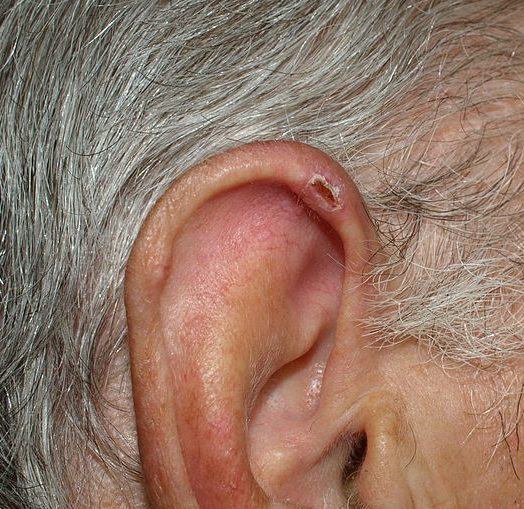What is Chondrodermatitis Nodularis Helicis?
Chondrodermatitis Nodularis Helicis (CNH) is a common, benign, though painful condition which presents as a small, tender, nodule on the helix of the ear. “It is a chronic inflammatory lesion, similar to a pressure sore on the ear,” explains Dr. Kellie Reed, a board certified Dermatologist at Sanova Dermatology in Austin, Texas.
Who gets it?
While the condition occurs most often in men, usually middle-aged and older, women can develop it as well. “We commonly see it in fair-skinned patients, especially those with severe sun-damaged,” notes Dr. Reed.
Why do you get it?
While the direct cause of CNH is unknown, many experts believe it to be the result of excessive or prolonged pressure. “Trauma, extreme cold, pressure, or sun. These kinds of insults and damage over time can initiate the disease.”
Should I Worry?
Chondrodermatitis Nodularis Helicis can be a significant cause of pain and discomfort, and many patient report that it interferes with sleep. It is possible that early skin cancer in the ear may be mistaken for CNH and so caution should be exercised when the condition is first discovered. It may also be an indication of autoimmune or connective tissue disorders such as lupus erythematosus, autoimmune thyroiditis, scleroderma, and dermatomyositis. Presentations like these are considerably rarer and usually occur in females and pediatric cases.
How do you treat it?
It’s important to avoid sleeping on the affected ear. A protector can be made or purchased to help alleviate pressure. Your dermatologist may treat the condition with a variety of options, such as collagen or cortisone injections, topical therapies, or with surgical intervention, depending on the severity of your condition. Wearing a warm hat when outside in the cold, and sleeping evenly on both sides will help prevent recurrence.
Contact Us
For more information on chondrodermatitis nodularis helicis, or to have your skin checked by our certified dermatologists, please contact us today to schedule your appointment.
Photo credit: Klaus D. Peter, Gummersbach, Germany [CC BY 2.0 (http://creativecommons.org/licenses/by/2.0)], via Wikimedia Commons
